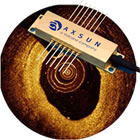 Optical Coherence Tomography (OCT) is an exciting new imaging technique that is being used to assess the interior anatomy of coronary arteries during and after angioplasty and stent placement. (Read our exclusive interview with Dr. Giulio Guagliumi for more information about how OCT can aid in measuring the healing of stents.)
Optical Coherence Tomography (OCT) is an exciting new imaging technique that is being used to assess the interior anatomy of coronary arteries during and after angioplasty and stent placement. (Read our exclusive interview with Dr. Giulio Guagliumi for more information about how OCT can aid in measuring the healing of stents.)
This technology is just now beginning to bridge the divide between research tool and clinical aide — for example, OCT can show high resolution pictures of stent struts and show whether they are covered or not. So the future for OCT imaging is definitely of major interest.
The OCT market currently is divided between two companies: Volcano Corporation (Nasdaq: VOLC) and St. Jude Medical (NYSE:STJ). And, as in any duopoly, one front of competition is the courtroom. So today, the results of a legal decision by the Massachusetts Superior Court were announced by both companies. And to read their press releases, you’d think that both companies had won!
Quick (I hope!) back-story: in 2007, Volcano, a company that has led in the field of intravascular imaging, acquired Texas-based CardioSpectra, a company that had developed an OCT imaging catheter, for $25 million. And then, in January 2009, Volcano acquired Axsun Technologies, a maker of laser modules that are central to OCT imaging. That acquisition was for $21.5 million.
Then, a year-plus later, St. Jude Medical, a company known mainly for its pacemakers, ICDs and Angio-Seal (a vascular closure device) purchased Lightlab Imaging, a company that had pioneered OCT. They paid $90 million.
To further complicate matters, Axsun Technologies was the sole supplier of Lightlab Imaging’s laser modules and they had a contract to do so until 2016. So suddenly you had the newly acquired subsidiary of one company supplying the central piece of its competitor’s newly acquired subsidiary’s main product.
No problem, right? Lawsuits? You bet.
In any case, last week the Massachusetts Superior Court issued a ruling, and today the results of that ruling were reported quite differently by each company involved.
St. Jude was first out of the gate. They claimed in their press release (“Volcano Corporation and Axsun Technologies misappropriated LightLab trade secrets“) that the Court had validated their claim of Volcano and Axsun colluding to impede “the growth of a major competitor,” and that there was a “scheme orchestrated by Volcano and implemented with Axsun’s assistance” to seek to supply LightLab with a less effective laser, and that this would “adversely affect the marketability” of LightLab’s imaging system. The bottom line was that the Court found Volcano and Axsun in violation of a Massachusetts State Law 93A, and assessed Volcano a judgment of $400,000 plus reasonable legal fees to be paid to St. Jude, and to be determined by the Court within the next couple weeks.
Sounds like a win for St. Jude.
Except later in the day, Volcano issued their own statement (“Massachusetts Court Rules in Favor of Volcano and Against St. Jude Medical“) in which they applauded the Court’s decision. Huh?
 Well, it seems that the Superior Court’s decision was 11 pages long, and that, while the Court did find Volcano in violation of the Massachusetts State law, it also dismissed St. Jude’s claims of trade secrets being used illegally, potentially a much more important finding. As Volcano CEO Scott Huennekens, stated:
Well, it seems that the Superior Court’s decision was 11 pages long, and that, while the Court did find Volcano in violation of the Massachusetts State law, it also dismissed St. Jude’s claims of trade secrets being used illegally, potentially a much more important finding. As Volcano CEO Scott Huennekens, stated:
“We are pleased with this ruling. Along with prior court decisions issued in October 2010 and in December 2009, it confirms that that Volcano/Axsun are not using LightLab’s purported trade secrets in our OCT development efforts. We intend to continue developing our OCT system, and can now do so with the reassurance that the Court concurs with our position. Volcano will continue to execute on our growth strategy of providing industry leading diagnostic and therapeutic imaging devices to improve patient outcomes.”
Presumably as a result of the initial negative news from the court decision, Volcano’s stock price, as of the market’s close today, dropped almost 5% since Thursday’s high. It would seem reasonable that this might be corrected once the complete impact of the Court’s decision becomes known. In any case, even with the severe two-day drop, Volcano’s stock price is up 33% from a year ago, not exactly a poor return.
More on these OCT Wars as they continue….



